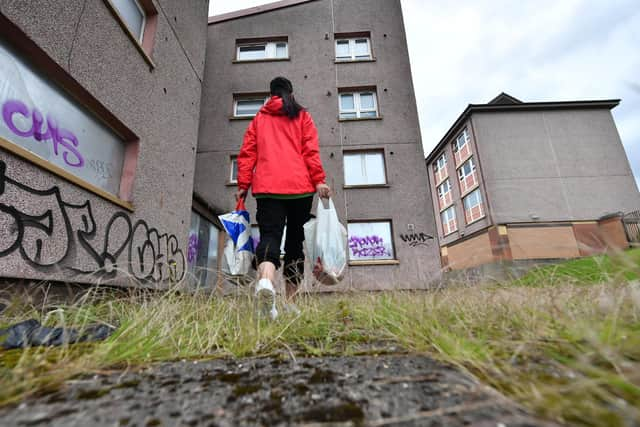Cost of living crisis in Glasgow: Study reveals which areas around the city are struggling most as more households fall into debt across UK
and live on Freeview channel 276
Glasgow East and Glasgow North East are the most ‘financially vulnerable’ areas in Scotland according to the Lowell Financial Vulnerability Index.
The only areas in the UK more vulnerable than the East and North East of Glasgow are areas around Sunderland in North East England, a few areas around Leeds, Belfast, Liverpool, and Birmingham.
Advertisement
Hide AdAdvertisement
Hide AdThe Financial Vulnerability Index is commissioned by Lowell, one of Europe’s largest debt collection companies, taking on debts accrued with telecoms and energy companies, amongst others.
Loading....
The researchers’ Financial Vulnerability Index scores each UK constituency from 1 to 100, with higher numbers signifying greater financial vulnerability.
It combines analysis of Lowell’s 9.5 million customer accounts with official statistics from the UK Government and Office for National Statistics.
It is based on six components that capture a household’s ability to manage daily finances and resist economic shocks: carrying debt in default, using alternative financial products such as payday loans, claiming work-related benefits, lacking emergency savings, holding a high-cost loan and relying heavily on credit.
Advertisement
Hide AdAdvertisement
Hide AdThis score continues to improve across the UK, but the researchers warned that some places, particularly less affluent urban areas, were being left behind.
Ranked from 0 to 100 - here’s how areas in Glasgow score on the financial vulnerability index:
- Glasgow North East: 50
- Glasgow East: 49.8
- Glasgow Central: 45
- Glasgow South West: 49.6
- Glasgow North: 39.9
- Glasgow North West: 45.6
- Glasgow South: 42.7
Many UK households are balancing on a “financial cliff edge”, according to research by a debt collection company and a US-based think tank.
People are increasingly falling into debt as they borrow to meet the growing cost of living, according to a study by debt collection company Lowell and the Urban Institute.
Advertisement
Hide AdAdvertisement
Hide AdThere are now as many people in default on their debts as there were at the peak of the pandemic, the research shows.
And while overall, the UK’s financial resilience is improving, this masks wide disparities across different towns and cities, the study shows.
In Scotland, the number of people aged 16-64 who are ‘economically inactive’ (not in work & not looking for work) has decreased by 5.7% over the last three years according to the Office for National Statistics (ONS).
- November 2019 - January 2020: 76,7312 people in Scotland economically inactive
- November 2020 - January 2021: 77,4406 people in Scotland economically inactive
- November 2021 - January 2022: 76,9216 people in Scotland economically inactive
- November 2022 - January 2023: 72,3478 people in Scotland economically inactive
John Pears, UK CEO at Lowell, said: “What this new data shows us is a complex picture of financial health in the UK. Overall it might be getting better, but we’re still miles away from where we were before the pandemic. Dive a little deeper and we can see a range of issues bubbling under the surface.
Advertisement
Hide AdAdvertisement
Hide Ad“The decline in overall financial vulnerability is important, but it’s still high. Default rates are rising. We need to think about what we’re doing, at an industry and government level, to improve the country’s financial health over the long term.”
A spokesperson for the Department for Work and Pensions said: “We recognise the pressures of the rising cost of living, which is why we delivered £1,200 of direct support to millions of households last year, including £400 towards energy costs, and will be providing a further £1,350 of support to the most vulnerable households in 2023-24.
“Our Energy Price Guarantee is also saving the typical household another £900 this winter and we are increasing benefits in line with inflation at 10.1% from April, while our Household Support Fund is helping people in England with essential costs.
“Those in debt may be able to access the ‘Breathing Space’ scheme, which gives them time to organise debt advice and solutions, while the government-sponsored MoneyHelper service has information about debt management and free debt advisory support.”


Advertisement
Hide AdAdvertisement
Hide AdA spokesperson for the Treasury added: "The best thing we can do to help families is to stick to the plan to halve inflation this year. This week at the Budget, the Chancellor will set out the next stage in our plan to bear down on inflation, reduce debt and grow the economy."
Comment Guidelines
National World encourages reader discussion on our stories. User feedback, insights and back-and-forth exchanges add a rich layer of context to reporting. Please review our Community Guidelines before commenting.
